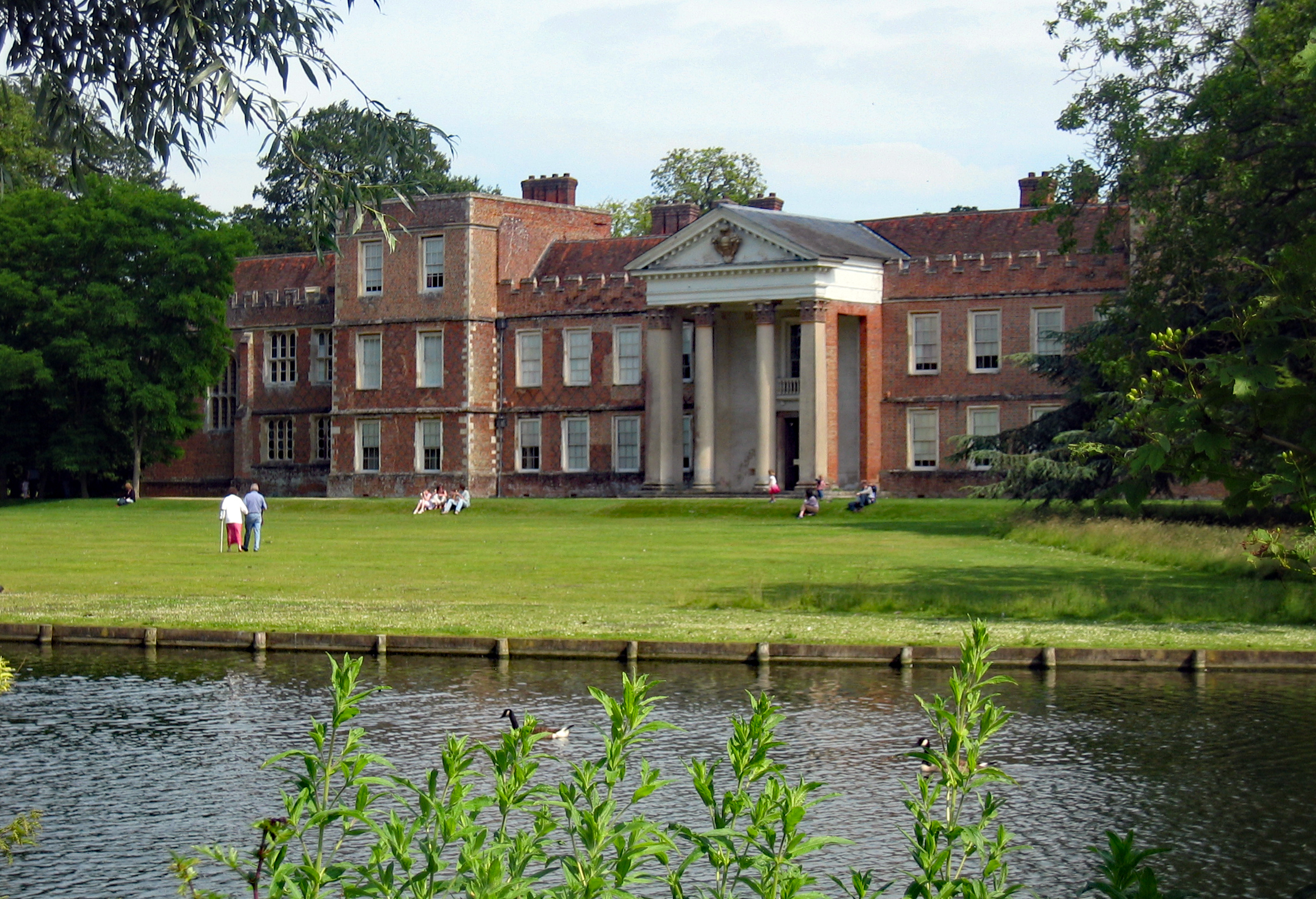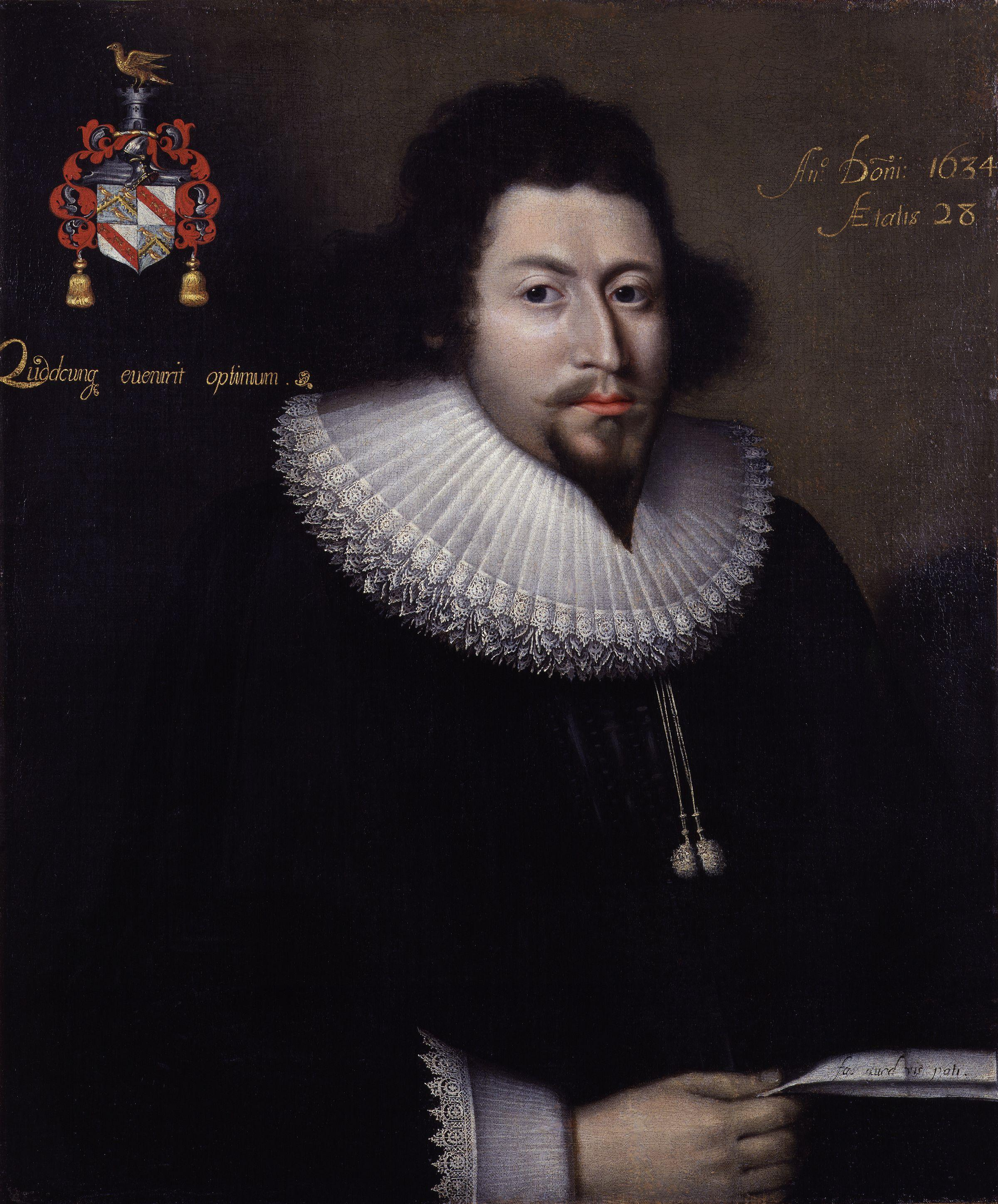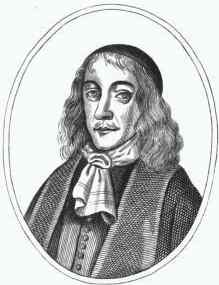|
Chaloner Chute
Chaloner Chute I (died 14 April 1659) of The Vyne, Sherborne St John, Hampshire, was an English lawyer, Member of Parliament and Speaker of the House of Commons during the Commonwealth. Origins Chute was the son of Charles Chute of the Middle Temple, a lawyer, by his wife Ursula Chaloner, a daughter of John Chaloner of Fulham in Middlesex. Career He was admitted to the Middle Temple and was called to the bar. He developed a great reputation as a defence lawyer in several high-profile cases including those of Sir Edward Herbert (the king's attorney-general), Archbishop Laud, the eleven members of the House of Commons charged by Fairfax and his army as delinquents, and James Duke of Hamilton. In 1653 he bought from Lord Sandys The Vyne, a very large Tudor manor house in Hampshire. He demolished much of the northern part of the decaying building and employed the architect John Webb, a pupil of Inigo Jones, to add the portico to the north front in the 1650s, the first of its kin ... [...More Info...] [...Related Items...] OR: [Wikipedia] [Google] [Baidu] |
Chaloner Chute
Chaloner Chute I (died 14 April 1659) of The Vyne, Sherborne St John, Hampshire, was an English lawyer, Member of Parliament and Speaker of the House of Commons during the Commonwealth. Origins Chute was the son of Charles Chute of the Middle Temple, a lawyer, by his wife Ursula Chaloner, a daughter of John Chaloner of Fulham in Middlesex. Career He was admitted to the Middle Temple and was called to the bar. He developed a great reputation as a defence lawyer in several high-profile cases including those of Sir Edward Herbert (the king's attorney-general), Archbishop Laud, the eleven members of the House of Commons charged by Fairfax and his army as delinquents, and James Duke of Hamilton. In 1653 he bought from Lord Sandys The Vyne, a very large Tudor manor house in Hampshire. He demolished much of the northern part of the decaying building and employed the architect John Webb, a pupil of Inigo Jones, to add the portico to the north front in the 1650s, the first of its kin ... [...More Info...] [...Related Items...] OR: [Wikipedia] [Google] [Baidu] |
Dudley North, 3rd Baron North
Dudley North, 3rd Baron North (158116 January 1666) was an English nobleman and politician. Biography North was the son of Sir John North and of Dorothy, daughter and heiress of Sir Valentine Dale. He succeeded his grandfather, Roger North, 2nd Baron North, at the age of nineteen. He was educated at Trinity College, Cambridge, and married in 1599 Frances, daughter of Sir John Brocket of Brocket Hall in Hertfordshire. He travelled in Italy, took part in the campaign of 1602 in the Netherlands, and on his return became a conspicuous figure at court, excelling in athletic exercises as well as in poetry and music, and gaining the friendship of Prince Henry. In 1606, while returning from Eridge to London, he discovered the springs at The Pantiles, Tunbridge Wells, which cured North himself of a complaint and quickly became famous. He also recommended the Epsom springs to the public. He supported and subscribed to the expedition to Guyana made by his brother Roger North () in 1619, ... [...More Info...] [...Related Items...] OR: [Wikipedia] [Google] [Baidu] |
Year Of Birth Missing
A year or annus is the orbital period of a planetary body, for example, the Earth, moving in its orbit around the Sun. Due to the Earth's axial tilt, the course of a year sees the passing of the seasons, marked by change in weather, the hours of daylight, and, consequently, vegetation and soil fertility. In temperate and subpolar regions around the planet, four seasons are generally recognized: spring, summer, autumn and winter. In tropical and subtropical regions, several geographical sectors do not present defined seasons; but in the seasonal tropics, the annual wet and dry seasons are recognized and tracked. A calendar year is an approximation of the number of days of the Earth's orbital period, as counted in a given calendar. The Gregorian calendar, or modern calendar, presents its calendar year to be either a common year of 365 days or a leap year of 366 days, as do the Julian calendars. For the Gregorian calendar, the average length of the calendar year (the mea ... [...More Info...] [...Related Items...] OR: [Wikipedia] [Google] [Baidu] |
Speakers Of The House Of Commons Of England
Speaker may refer to: Society and politics * Speaker (politics), the presiding officer in a legislative assembly * Public speaker, one who gives a speech or lecture * A person producing speech: the producer of a given utterance, especially: ** In poetry, the literary character uttering the lyrics of a poem or song, as opposed to the author writing the words of that character; see Character (arts) Electronics * Loudspeaker, a device that produces sound ** Computer speakers, speakers sold for use with computers ** Speaker driver, the essential electromechanical element of the loudspeaker Arts, entertainment and media * Los Speakers (or "The Speakers"), a Colombian rock band from the 1960s * ''The Speaker'' (periodical), a weekly review published in London from 1890 to 1907 * ''The Speaker'' (TV series), a 2009 BBC television series * "Speaker" (song), by David Banner * "Speakers" (Sam Hunt song), 2014 * ''The Speaker'', the second book in Traci Chee's Sea of Ink and Gold trilog ... [...More Info...] [...Related Items...] OR: [Wikipedia] [Google] [Baidu] |
1659 Deaths
Events January–March * January 14 – In the Battle of the Lines of Elvas, fought near the small city of Elvas in Portugal during the Portuguese Restoration War, the Spanish Army under the command of Luis Méndez de Haro suffers heavy casualties, with over 11,000 of its nearly 16,000 soldiers killed, wounded or taken prisoner; the smaller Portuguese force of 10,500 troops, commanded by André de Albuquerque Ribafria (who is killed in the battle) suffers less than 900 casualties. * January 24 – Pierre Corneille's ''Oedipe'' premieres in Paris. * January 27 – The third and final session of the Parliament of the Commonwealth of England, Scotland and Ireland is opened by Lord Protector Richard Cromwell, with Chaloner Chute as the Speaker of the House of Commons, with 567 members. "Cromwell's Other House", which replaced the House of Lords during the last years of the Protectorate, opens on the same day, with Richard Cromwell as its speaker. * January ... [...More Info...] [...Related Items...] OR: [Wikipedia] [Google] [Baidu] |
Lislebone Long
Sir Lislebone Long (1613–1659), was a supporter of the Parliamentary cause during the English Civil War, but he was a Presbyterian and he resisted Pride's Purge and although not secluded by Pride, he shortly afterwards absented himself for a short while from the House. After the regicide of Charles I, in which he took no part, he was an active member of the three Protectorate parliaments and was knighted by the Lord Protector Oliver Cromwell. Biography Lislebone Long baptised Loveban, was born at Beckington, Somerset, the son of William Long of Stratton on the Fosse and Mary Lovibond. He graduated from Magdalen Hall, Oxford, 1630–31 with a B.A and was called to the bar at Lincoln's Inn, 1640 Long was descended from the Longs of Wiltshire. In local affairs Long identified both before and during the Civil War with at least one of his Wiltshire relatives, Sir Walter Long, 1st Baronet of Whaddon who was an outspoken critic of the King. Like his cousin, he was a presbyterian and ... [...More Info...] [...Related Items...] OR: [Wikipedia] [Google] [Baidu] |
Bulstrode Whitelocke
Sir Bulstrode Whitelocke (6 August 1605 – 28 July 1675) was an English lawyer, writer, parliamentarian and Lord Keeper of the Great Seal of England. Early life He was the eldest son of Sir James Whitelocke and Elizabeth Bulstrode, and was born on 6 August 1605 at George Croke's house in Fleet Street, London. He was baptized on 19 August 1605 at the nearby church of St Dunstan-in-the-West, where his mother's parents were married in 1571; his notorious uncle Edmund Whitelocke, being one of the godfathers, announced that the child was to be called Bulstrode. The vicar demurred, but Edmund insisted that he bear his mother's name, "Bulstrode or Elizabeth, let them choose which they please". Bulstrode was educated briefly at Eton College, then at Merchant Taylors' School and at St John's College, Oxford, where he matriculated on 8 December 1620. Early career He left Oxford, without a degree, for the Middle Temple, and was called to the bar in 1626; in 1628 he became treasure ... [...More Info...] [...Related Items...] OR: [Wikipedia] [Google] [Baidu] |
Sir Francis Gerard, 2nd Baronet
Sir Francis Gerard, 2nd Baronet (12 October 1617 – December 1680) was an English politician who sat in the House of Commons variously between 1641 and 1660. Gerard was the son of Sir Gilbert Gerard, 1st Baronet of Harrow on the Hill and his wife Mary Barrington, a daughter of Sir Francis Barrington and Joan Cromwell, and a cousin of Oliver Cromwell. In 1641, Gerard was elected Member of Parliament for Seaford the Long Parliament and sat until 1648. In 1659 he was elected MP for Middlesex in the Third Protectorate Parliament. In 1660, Gerard was elected Member of Parliament for Bossiney in the Convention Parliament. He inherited the baronetcy A baronet ( or ; abbreviated Bart or Bt) or the female equivalent, a baronetess (, , or ; abbreviation Btss), is the holder of a baronetcy, a hereditary title awarded by the British Crown. The title of baronet is mentioned as early as the 14th ... on the death of his father in 1670. Gerard died at the age of 63. Gerard ... [...More Info...] [...Related Items...] OR: [Wikipedia] [Google] [Baidu] |
William Kiffen
William Kiffin (1616–1701), sometimes spelled William Kiffen, was a seventeenth-century English Baptist minister. He was also a successful merchant in the woollen trade. Life He was born in London early in 1616. His family appears to have been of Welsh descent. Both his parents died of the plague which broke out in June 1625. His father left property which was invested by some relatives in their business; on their failure little was saved. Kiffin was apprenticed in 1629 to John Lilburne, then a brewer (note: this probably is inaccurate; Liliburne was the same age as Kiffin; he was also not a brewer until 1641ish); he left Lilburne in 1631, and seems to have been apprenticed to a glover (Kiffin became a Freeman of the Leathersellers' Company on 10 July 1638, having served an apprenticeship to John Smith, thought to have been a glover by trade). In 1631 Kiffin attended the sermons of many puritan divines, including John Davenport and Lewis du Moulin, but attached himself next y ... [...More Info...] [...Related Items...] OR: [Wikipedia] [Google] [Baidu] |
John Barkstead
John Barkstead (died 1662) was an English major general and regicide. Barkstead was a goldsmith in London; captain of parliamentary infantry under Colonel Venn; governor of Reading, 1645: commanded regiment at siege of Colchester; one of the king's judges, 1648; governor of Yarmouth, 1649, Lieutenant of the Tower of London, 1652; M.P. for Colchester, 1654, and Middlesex, 1656; knighted, 1656: escaped to continent, 1660; arrested, 1662; brought to England and executed. Biography The date of Barkstead's birth is unknown, was originally a goldsmith in the Strand, and was often taunted by Robert Lilburne (a leveller) and the royalist pamphleteers with selling thimbles and bodkins. "Being sensible of the invasions which had been made upon the liberties of the nation, he took arms among the first for their defence in the quality of captain to a foot company in the regiment of Colonel Venn". On 12 August 1645 he was appointed by the House of Commons governor of Reading, and his appointm ... [...More Info...] [...Related Items...] OR: [Wikipedia] [Google] [Baidu] |
Edmund Harvey
Edmund Harvey or Hervey (c.1601–1673) was an English soldier and member of Parliament during the English Civil War, who sat as a commissioner at the Trial of King Charles I and helped to draw up the final charge. Although present on 27 January 1649 when the death warrant was signed he did not add his signature. Life He was born the son of Charles Harvey, a London merchant, and his wife Alice. He followed his father into trade, being apprenticed in 1619 and becoming a silk merchant and freeman of the Drapers' Company in 1627. When the Civil War broke out he enlisted as a Parliamentarian and was commissioned a Colonel of horse and fought at the siege of Gloucester and in the north. He then refused to obey orders to join up with the rest of the army until he was paid, and was instead discharged. He acquired property in Suffolk, where he was a deputy lieutenant in 1643, receiver-general for the county in 1644, and a keen member of the parliamentary committee from 1643 to 1645. In ... [...More Info...] [...Related Items...] OR: [Wikipedia] [Google] [Baidu] |
Josiah Berners
Josiah ( or ) or Yoshiyahu; la, Iosias was the 16th king of Judah (–609 BCE) who, according to the Hebrew Bible, instituted major religious reforms by removing official worship of gods other than Yahweh. Josiah is credited by most biblical scholars with having established or compiled important Hebrew scriptures during the "Deuteronomic reform" which probably occurred during his rule. Josiah became king of the Kingdom of Judah at the age of eight, after the assassination of his father, King Amon. Josiah reigned for 31 years, from 641/640 to 610/609 BCE. Josiah is known only from biblical texts; no reference to him exists in other surviving texts of the period from Egypt or Babylon, and no clear archaeological evidence, such as inscriptions bearing his name, has ever been found. Nevertheless, most scholars believe that he existed historically and that the absence of documents is due to few documents of any sort surviving from this period, and to Jerusalem having been occupied, ... [...More Info...] [...Related Items...] OR: [Wikipedia] [Google] [Baidu] |


_School_-_Dudley_North_(1581–1666)%2C_3rd_Baron_North_-_719396_-_National_Trust.jpg)





